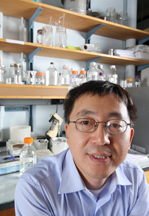Drug combo suppresses growth of late-stage prostate cancer tumors
January 27, 2015
 |
|
Xiaoqi Liu |
WEST LAFAYETTE, Ind. - Low doses of metformin, a widely used diabetes medication, and a gene inhibitor known as BI2536 can successfully halt the growth of late-stage prostate cancer tumors, a Purdue University study finds.
Prostate cancer causes the second-highest number of cancer-related deaths in men in the U.S., and methods of treating advanced prostate cancer are limited.
Xiaoqi Liu (pronounced zhow-CHEE' LEE'-oo), associate professor of biochemistry and cancer research, and fellow researchers found that the drugs metformin and BI2536 can work together to suppress the spread of prostate cancer that resists all other available treatments, potentially prolonging patients' lives.
"We've found a promising way to treat late-stage prostate cancer," Liu said. "By combining low levels of two well-tolerated drugs, the progression of this disease could be significantly delayed. Completely curing the cancer at the advanced stage is pretty much impossible, but this treatment might manage it for a while - that's exciting."
A number of treatments exist for the earlier stages of prostate cancer, which grows slowly compared with many other cancers. Because prostate cancer cells need the male sex hormone androgen to develop, one way to treat the disease is to suppress androgen - a process known as castration. If the cancer continues to spread, the patient often undergoes chemotherapy. As a last resort, drugs that block the synthesis of androgen by prostate cancer cells can be used, but these medications only extend a patient's lifespan for several months.
New approaches to treating the most persistent forms of prostate cancer are "urgently needed," Liu said.
Adding to the challenge is the fact that castration treatment can inadvertently encourage the cancer to get tougher. It can heighten oxidative stress on the prostate gland, which increases the expression of Plk1, a gene that has been linked to many cancers. Over-expression of Plk1 can also trigger the synthesis of androgen.
"The goal of castration is to block androgen synthesis," Liu said. "But cancer cells eventually become 'smart' enough to make androgen anyhow, which is why the cancer continues to grow."
Additionally, castration can disrupt the body's metabolism and lead to insulin resistance, which also can stimulate the production of androgen. The cancer will spread until both of these side effects are stopped, Liu said.
Previous studies showed that metformin - an inexpensive, antidiabetic drug that has been commonly used for more than 40 years - is particularly potent to prostate cancer tumors.
Working with fellow researchers from Purdue, the University of Wisconsin-Madison and the Indiana University School of Medicine, Liu found that a combination of low levels of metformin and BI2536, a drug that stifles the activity of Plk1, could work in tandem to slow the growth of prostate tumors too advanced for current treatments by promoting the self-destruction of cancer cells and preventing androgen synthesis.
The drugs did not impact healthy prostate cells, a "key finding," Liu said. "Ideally, cancer therapy will have minimal effects on normal cells."
Because metformin helps regulate metabolism, it may reverse some of the metabolic damage caused by castration, he said.
The researchers tested the drugs in a classical cell culture assay of prostate cancer cells and in advanced prostate tumors in mice. Low concentrations of the drugs significantly slowed the development of cancer in both trials. The mice tumors were grown from the tumor cells of a late-stage prostate cancer patient, suggesting that the treatment would prove effective in humans.
"Those results were amazing," Liu said. "These are the first data we've generated from a real patient, so I was almost jumping in the air when I saw that it worked."
Liu said that the next step in the research is to test the combination of drugs in clinical trials. Further research is also needed to understand the underlying mechanism of metformin and why it is effective at suppressing prostate cancer.
The paper was published in the Journal of Biological Chemistry on Jan. 24 and is available at http://www.jbc.org/content/290/4/2024.full.
The National Institutes of Health, the National Science Foundation, the American Cancer Society and the China Scholarship Council provided funding for the research.
Writer: Natalie van Hoose, 765-496-2050, nvanhoos@purdue.edu
Source: Xiaoqi Liu, 765-496-3764, liu8@purdue.edu
Related news release:
Genes may be good target for tough-to-kill prostate cancer cells: http://www.purdue.edu/newsroom/research/2011/110926LiuPten.html
ABSTRACT
Inhibition of polo-like kinase 1 (Plk1) enhances the anti-neoplastic activity of metformin in prostate cancer
Chen Shao 1; Nihal Ahmad 2; Kurt Hodges 3; Shihuan Kuang 4; Tim Ratliff 5; Xiaoqi Liu 1, 5
1 Department of Biochemistry, Purdue University, West Lafayette, IN 47907
2 Department of Dermatology, University of Wisconsin, Madison, WI 53706
3 Department of Pathology and Laboratory Medicine, Indiana University School of Medicine, Indianapolis, IN 46202
4 Department of Animal Sciences, Purdue University, West Lafayette, IN 47907
5 Purdue Center for Cancer Research, Purdue University, West Lafayette, IN 47907
E-mail: liu8@purdue.edu
The widely used anti-diabetic drug metformin has been shown to exert strong anti-neoplastic actions in numerous tumor types, including prostate cancer. In this study, we show that BI2536, a specific Plk1 inhibitor, acts synergistically with metformin in inhibiting prostate cancer cell proliferation. Furthermore, we also provide evidence that Plk1 inhibition renders prostate cancer cells carrying wild types p53 to be much more sensitive to low dose metformin treatment. Mechanistically, we found that co-treatment with BI2536 and metformin induces p53-dependent apoptosis and further activates the p53/Redd-1 pathway. Moreover, we also show that BI2536 treatment inhibited metformin-induced glycolysis and glutamine anaplerosis, both of which are survival responses of cells against mitochondrial poisons. Finally, we confirmed the cell-based observations using both cultured cell-derived and patient-derived xenograft studies. Collectively, our findings support another promising therapeutic strategy by combining two well-tolerated drugs against prostate cancer proliferation and the progression of androgen-dependent prostate cancer to castration-resistant stage.
Ag Communications: (765) 494-2722;
Keith Robinson, robins89@purdue.edu
Agriculture News Page

